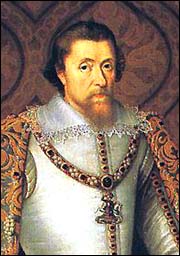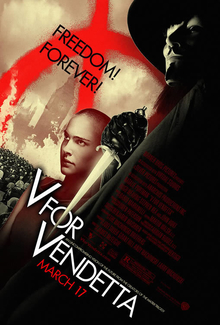Depicted: Fun
Depicted: Wrong
There is some legitimacy to the point that the film shanghais the historical person of Guy Fawkes and turns him into some kind of radical freedom fighter, which V goes on to later parallel and emulate. While Kalpar is largely correct in labeling Fawkes as a religious terrorist, there are some important parallels between the goal Fawkes was trying to achieve and what V tries to achieve in the film.
For those of you who don't know, the lead up into the Gunpowder Plot and Guy Fawkes Day begins with Henry VIII's break from the Catholic Church and the subsequent back and forth England had between being a Catholic nation and a Protestant nation with the monarch as head of both Church and State. During the reign of Queen Elizabeth, several rather stringent laws were passed by Parliament to enforce the authority of the Church of England and Elizabeth's role as the head of said Church. While the laws were targeted directly at the queen's ministers and vassals, they nevertheless still applied to the everyman as well. Elizabeth's successor would have to deal shrewdly with both Catholics and Protestants to ensure that England could be governed effectively.
Enter King James the I of England and VI of Scotland. James was a masterful politican who did his absolute best to play both sides, Catholic and Protestant, off of each other until he determined who would "win" in the end. James' bid for the English throne was not an easy one to make, and much like modern politicians he was willing to promise a great deal to gain the support of English nobles. Specifically, James promised to repeal the laws restricting Catholicism, and to allow some degree of religious freedom within his realm. As you might expect, once he was strapped into the throne, James' disdain for "popery" is keenly felt and the laws against Catholicism in England would be kept in place or made more stringent.

Depicted: Douche
The leaders of the Gunpowder Plot sought to redress these wrongs through the natural course of blowing up the King and all of Parliament at the opening of a new session scheduled for 5 Novemeber 1605. Their overall plan after having blown up said king was to reinstate England as a Catholic nation with a Catholic monarch at her head.
While perhaps not the best comparison and means of political redress, I do think that Fawkes and V are both striving for the same goal: the overthrow of a government which has up to that point oppressed a given group of its citizens. Again, granted the means are not exactly keen, nor is the plan beyond the attack very well thought out as to what will be accomplished after the explosion, but the philosophy of the ideas is largely congruent; the head of state has chosen to ignore or spurn the rights of a (significant) portion of the citizenry. Is Fawkes the libertarian fighter we see in the film? No. But, I think to say that his actions are not driven by a restriction on human rights would be a fallacy.
Like Fawkes, V's drive for liberty is motivated by personal cause. Whereas for Fawkes it was religious vengeance on a king whom he felt betrayed his promises to Catholics, for V it is on a leadership who betrayed the trust of the people and used them for experimentation and fearful exploitation. To Kalpar's point that V is motivated not by a desire to liberate Britain from Norsefire, but by personal revenge, I would have to agree to some extent. I do think V is trying to free Britain from the rule of a government whose methods and means are horrifically oppressive and atrocious, however, he seems to go about doing so in such a way that allows him to revenge himself on those who personally wronged not only him, but all those who were subjected to the tests of the government run facilities.
The individuals V seeks to bring down, with the possible exception of the coroner, were people who held leadership roles in the party and the government. Prothero specifically springs to mind as one who might be necessary for V to remove. Removing a trusted and respected and authoritative public party voice is something which might allow the citizenry to think a little more for themselves. Perhaps it is a weak argument, but the communications we receive do color our viewpoints and assassinating individuals like Prothero, Creedy, etc. are necessary in ensuring not only that the populace might have a chance at change, but that the old regime does not rear its head once again. I would argue that the philosophical point here is muddied by the aversion to V's methods; we'd like to think the hero of the story could act simply for the common good and interest and not in his own. V, for better or worse tries to have his cake and eat it too. I argue that it is certainly revenge, but a necessary one.
Depicted: Motivation
Finally to Kalpar's point that V is not a character he can get behind, I can fully understand his position, but I simply disagree. V is an anarchist in the sense that he does not want the government that is established. Fawkes was an anarchist in much the same way. Though I think to call them true anarchists that wanted no government at all would be a gross misnomer. It was not that Fawkes or V wanted NO government, but simply that the government that existed was not serving their personal interests or the interest of any who were like them. Further to the point, the types of government Fawkes and V were up against, a divine right monarchy and a despotic "conservative" regime respectively, offered them no other means of redress save violence. In a sense I mean that "You don't vote for kings." The system had failed them in offering them no means of redress or protest to change the system short of literally blowing it up. The system needed to be burnt to the ground because there was no way to change it short of tearing it down and rebuilding it. V does not have a problem with the whole of government and welcomes Finch's investigation into the Norsefire regime, but within the regime itself, there was no way change could have been reasonably affected. However, I do agree with Kalpar that there is going to be a good deal of strife and turmoil as the country attempts to rebuild.
As Kalpar said, much of these reviews was subjective, and on an objective level the film is well done. I suppose it largely comes down to where your personal alignment on the issue stands. To grossly over-embellish my stance vs. Kalpar's, he is Adams and I am Jefferson. Ideally people should not have to fear their governments and governments should not have to fear their people. Both should be able to rely on each other for mutual support, encouragement and growth. When this is not possible, the government needs must be changed for the good of the people.
Depicted: Badasses
As a final note, I have always liked the fact that Guy Fawkes Day typically falls around the American Election Day. I do like that, for me at least, it serves as a reminder that the principles of government necessitate consent of the people and that if redress is needed then we have the forums to do that. Free speech, protest, and the right to vote are all essential to our society and allow for transitions which do not require the detonation of explosives. Thankfully we have grown into a culture with values and traditions not found in Fawkes' or V's England; I think V for Vendetta serves the purpose of illustrating the barbarity that can occur when those values are not respected. So in closing, whatever you do tomorrow yanks, just make sure you get to the polls and exercise the freedoms that you have!
God Save the Queen
- Carvan


